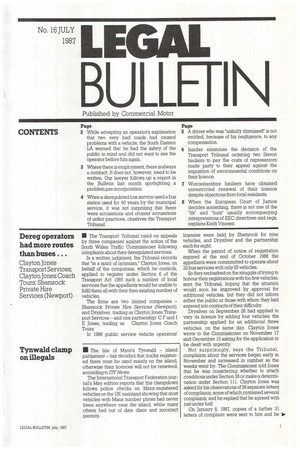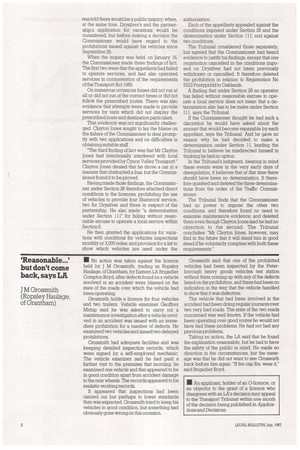Dereg operators had more routes than buses . . .
Page 91

Page 92

If you've noticed an error in this article please click here to report it so we can fix it.
Clayton Jones Transport Services; Clayton Jones Coach Tours; Shamrock Private Hire Services (Newport)
IN The Transport Tribunal ruled on appeals by three companies against the action of the South Wales Traffic Commissioner following complaints about their deregulated services.
In a written judgment, the Tribunal records that "in a spirit of optimism," Clayton Jones, on behalf of the companies, which he controls, applied to register under Section 6 of the Transport Act 1985 such a number of local services that the appellants would be unable to fulfil them all with their then existing number of vehicles.
The firms are two limited companies Shamrock Private Hire Services (Newport); and Drysilver, trading as Clayton Jones Transport Services and one partnership: C F and I E Jones, trading as Clayton Jones Coach Tours.
In 1986 public service vehicle operators' licences were held by Shamrock for nine vehicles, and Drysilver and the partnership each for eight.
When the period of notice of registration expired at the end of October 1986 the appellants were commmitted to operate about 32 bus services with only 25 vehicles.
So they embarked on the struggle of trying to honour their registrations with too few vehicles, says the Tribunal, hoping that the situation would soon be improved by approval for additional vehicles, but they did not inform either the public or those with whom they had entered into contracts of their difficulty.
Drysilver on September 26 had applied to vary its licence by adding four vehicles; the partnership applied for an additional three vehicles, on the same day. Clayton Jones wrote to the Commissioner on November 17 and December 13 asking for the application to be dealt with urgently.
Not surprisingly, says the Tribunal, complaints about the services began early in November and increased in number as the weeks went by. The Commissioner told Jones that he was considering whether to attach conditions under Section 26 or make a determination under Section 111. Clayton Jones was asked for his observations of 36 separate letters of complaints, some of which contained several complaints, and he replied that he agreed with just under half On January 8, 1987, copies of a further 31 letters of complaint were sent to him and he was told there would be a public inquiry, when, at the same time, Drysilver's and the partnership's application for variations would be considered, but before making a decision the Commissioner would have regard to the prohibitions issued against his vehicles since September 26.
When the inquiry was held, on January 16, the Commissioner made three findings of fact. The first two were that the appellants had failed to operate services, and had also operated services in contravention of the requirements of the Transport Act 1985, On numerous occasions buses did not run at all or did not run at the correct times or did not follow the prescribed routes. There was also evidence that attempts were made to provide services by taxis which did not display the prescribed route and destination particulars.
That evidence was not significantly challenged. Clayton Jones sought to lay the blame on the failure of the Commissioner to deal promptly with two applications and on difficulties in obtaining suitable staff.
"The third finding of fact was that Mr Clayton Jones had intentionally interfered with local services provided by Cynon Valley Transport." Clayton Jones denied that he drove a car in a manner that obstructed a bus, but the Commissioner found it to be proved.
Having made those findings, the Commissioner under Section 26 therefore attached direct conditions to the licences, prohibiting the use of vehicles to provide four Shamrock service, two for Drysilver and three in respect of the partnership. He also made "a determination under Section 111" for failing without reasonable excuse to operate a local service within Section 6.
He then granted the applications for variations with conditions for vehicles inspections monthly or 3,000 miles; and provision for a list to show which vehicles are used under the authorisation.
Each of the appellants appealed against the conditions imposed under Section 26 and the determination under Section 111; and against two conditions.
The Tribunal considered those separately, but agreed that the Commissioner had heard evidence to justify his findings, except that one registration cancelled in the conditions imposed on Drysilver had not been previously withdrawn or cancelled. It therefore deleted the prohibition in relation to Registration No 5523 Pontypridd to Oaklands.
A finding that under Section 26 an operator has failed without reasonable excuse to operate a local service does not mean that a determination also has to be make under Section 111, says the Tribunal.
If the Commissioner thought he had such a discretion he would have asked about the amount that would become repayable by each appellant, says the Tribunal And he gave no reason why he had decided to make a determination under Section 11, leading the Tribunal to believe he misdirected himself in thinking he had no option.
In the Tribunal's judgment, bearing in mind these events were in the very early days of deregulation, it believes that at that time there should have been no determination, It therefore quashed and deleted the three determinations from the order of the Traffic Commissioner.
The Tribunal finds that the Commissioner had no power to impose the other two conditions, and therefore found no need to examine maintenance evidence; and deleted them even though Clayton Jones said he had no objection to the second. The Tribunal concludes: "Mr Clayton Jones, however, may find in the future that it will stand him in good stead if he voluntarily complies with both these requirements,"




































































































